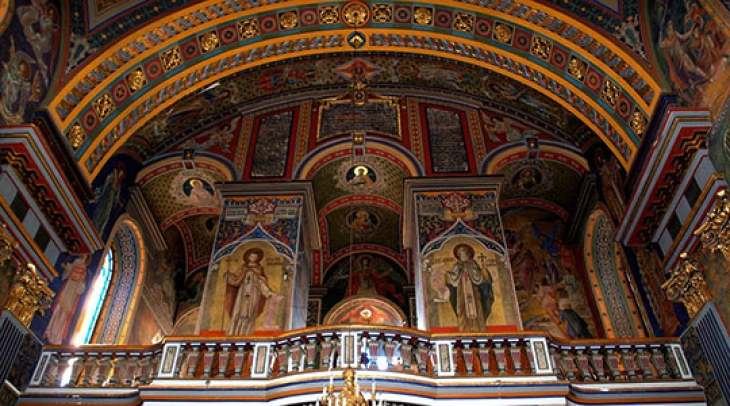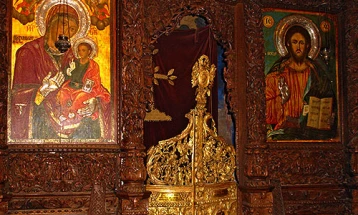Religious calendars
- Macedonian Orthodox Church Calendar; The Holy Martyr Callistratus

10 October 2024 (MIA)
Macedonian Orthodox Church Calendar
The Holy Martyr Callistratus
Born in Carthage, he was a Christian from his birth, as his father and grandfather were. One of his forbears, Neochorus, served as a soldier in Jerusalem under Pontius Pilate at the time of the Passion of our Lord and Saviour Jesus Christ. Seeing the many miracles that were wrought at the time of Christ’s death, Neochorus came to believe in Him, and was taught the Faith and baptised by the apostles. Returning home, Neochorus took his Christian faith to his own people, like a precious pearl. So, in time, St Callistratus was born, baptised and brought up a Christian. When he went into the army, there was no other Christian in his regiment. One of his companions, seeing holy Callistratus get up at night and pray to God, reported him to the commander, Persentinus, as a Christian – and Persentinus was a harsh torturer of Christians. When he was convinced that Callistratus was indeed a Christian, the commander ordered him to offer sacrifice to idols, which Callistratus immediately refused to do. Then Callistratus was harshly beaten and thrown into the sea, but God’s power preserved him, and he emerged from the sea unharmed. Seeing Callistratus’s endurance and his miracles, forty-nine soldiers came to believe in Christ the Lord, and they were beaten and thrown into prison along with him. In prison, St Callistratus instructed his companions in the Faith and encouraged them. They showed great courage in suffering, and the Lord showed great power through them. The wicked torturer sent soldiers to the prison at night, and they slew Callistratus and the other forty-nine. They suffered for the truth in 304, and a church was later built over their relics.
Catholic Calendar
St. Louis Bertrand
Born at Valencia, Spain, 1 January 1526 and died 9 October 1581. His patents were Juan Bertrand and Juana Angela Exarch. Through his father he was related to the illustrious St. Vincent Ferrer, the great thaumaturgus of the Dominican Order. The boyhood of the saint was unattended by any of the prodigies that frequently forecast heroic sanctity. At an early age he conceived the idea of becoming a Friar Preacher, and despite the efforts of his father to dissuade him, was clothed with the Dominican habit in the Convent of St. Dominic, Valencia, 26 August 1544. After the usual probation, in which he distinguished himself above all his associates in the qualities of an ideal religious, he pronounced the vows that irrevocably bound him to the life of perfection. The profound significance of his religious profession served as a stimulus to the increase of virtues that already gave evidence of being cast in heroic mould. In demeanour he was grave and apparently without any sense of humour, yet withal possessed of a gentle and sweet disposition that greatly endeared him to those with whom he came in contact. While he could lay no claim to the great intellectual gifts and ripe scholarship that have distinguished so many of the saints of the Dominican order, he applied himself assiduously to study, and stored his mind with the sacred truths expounded in the pages of the “Summa”. In 1547 the Archbishop of Valencia, St. Thomas of Villanova, advanced him to the priesthood. The extraordinary sanctity of the young Dominican’s life, and the remarkable influence he exercised on those about him, singled him out as one peculiarly fitted to lead others along the path of perfection. Consequently, he was appointed to the most responsible office of master of novices, in the convent at Valencia, the duties of which he discharged at different intervals for an aggregate of thirty years. The plague that decimated the inhabitants of Valencia and the vicinity in 1557, afforded the saint an excellent opportunity for the exercise of his charity and zeal. Tirelessly he ministered to the spiritual and physical needs of the afflicted. With the tenderness and devotion of a mother he nursed the sick. The dead he prepared for burial and interred with his own hands. When the plague had subsided, the zeal of the holy novice-master sought to extend the scope of his already large ministry into the apostolate of preaching. Though possessed of none of the natural qualities deemed essential for a successful career in the pulpit, he immediately attracted attention as a preacher of great force and far-reaching influence. The cathedral and most capacious churches were placed at his disposal, but proved wholly inadequate to accommodate the multitude that desired to hear him. Eventually it became necessary for him to resort to the public squares of the city. It was probably the fame of his preaching that brought him to the attention of St. Teresa, who at this time sought his counsel in the matter of reforming her order.







